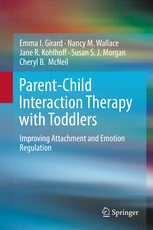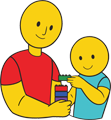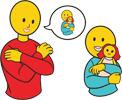 Purchase Book at Springer About the Authors PCIT Toddler Training Services |
About PCIT-Toddlers and the PCIT-Toddlers Book ResourceParent-Child Interaction Therapy with Toddlers is an early intervention program that involves coaching parents while they interact with their 12 to 24 month old children. Adapting the play therapy and compliance training procedures of PCIT, parents are coded and coached in the use of therapeutic parenting practices proven to decrease problematic behaviors, improve children's language, and encourage young children to follow directions.
|
|||||||||||
Parent-Child Interaction Therapy with Toddlers is a must-have resource for early intervention practitioners, researchers, and students in the fields of clinical child and school psychology, social work, pediatrics, infancy and early childhood development, child and adolescent psychiatry, primary care medicine, and related disciplines.
This PCIT-T book describes novel components for the special needs of toddlers, including specific procedures for promoting the attachment relationship and emotion regulation in both the caregivers and children. Central to the model is the understanding that difficult behaviors in toddlers are a sign of emotion dysregulation rather than deliberate defiance. It is with the assistance of a nurturing and sensitive caregiver that the child's capacity to manage emotion develops.
|
Come In 
|
Assist 
|
Reassure 
|
Emotional Validation 
|
Soothe 
|
The "CARES" model (Come In, Assist, Reassure, Emotional Validation, and Soothe) of PCIT-T involves coaching parents to come in close, assist, reassure, validate emotions, and soothe when the toddlers experience the "big emotions" that are characteristic of this age range. Parents also are coached in their own set of adult CARES skills designed to promote relaxation and positive self-talk during stressful parenting situations. Finally, PCIT-T includes an adapted parent-directed interaction in which children learn to follow directions through a tell-show-try again-guide procedure and labeled praise for listening. Presenting referral concerns include:
- Tantrums
- Aggression (e.g., hitting, biting, pinching)
- Fussiness (e.g., screaming, whining, crying)
- Anger, frustration, head-banging
- Attachment difficulties (e.g., rejection of parent, difficult to comfort)
- Separation anxiety or withdrawal from parent
- Developmental concerns (e.g., autistic behaviors, language problems)
- Child abuse and neglect
- Parental stress (e.g., anxiety, dissatisfaction, difficulty coping, lack of confidence)
The initial chapters of this book provide an overview of attachment and behavioral theory that are foundational to the treatment model. Subsequent chapters provide a session-by-session guide and clinical manual for implementation of PCIT-T as well as the clinician tools needed to monitor treatment outcomes and fidelity to the model.






